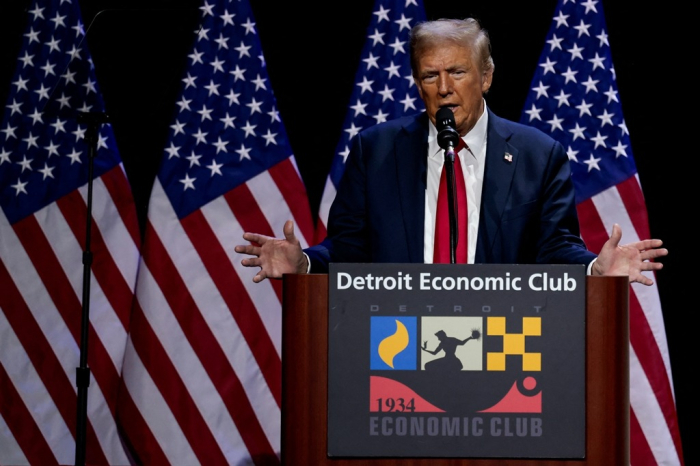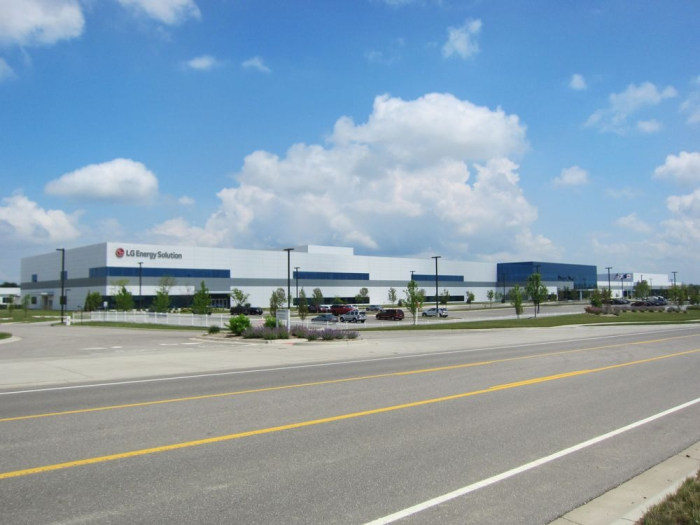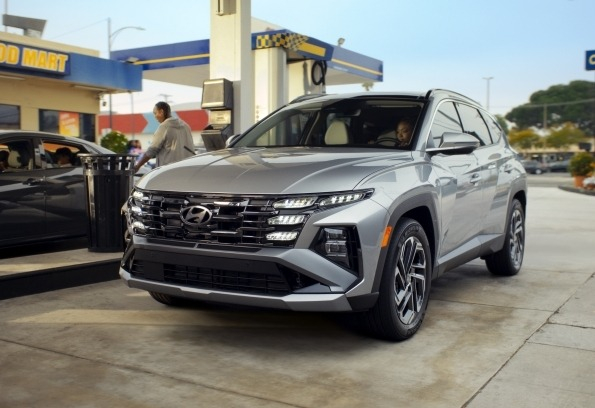Electric vehicles
Korean EV, battery makers to suffer from Trump’s plan to end incentives
Shares in battery makers such as LG Energy, Samsung SDI tumble as Trump’s transition team also seeks to end AMPC
By Nov 15, 2024 (Gmt+09:00)
4
Min read
Most Read
LG Chem to sell water filter business to Glenwood PE for $692 million


KT&G eyes overseas M&A after rejecting activist fund's offer


Mirae Asset to be named Korea Post’s core real estate fund operator


StockX in merger talks with Naver’s online reseller Kream


Meritz backs half of ex-manager’s $210 mn hedge fund



WASHINGTON/SEOUL — US President-elect Donald Trump’s transition team is seeking to eliminate federal incentives for electric vehicles, dealing a heavy blow to South Korean EV and battery makers that have invested 70 trillion won ($50.2 billion) in the world’s third-largest clean car market.
Trump's transition team plans to end a $7,500 consumer tax credit for EV purchases as part of broader tax-reform legislation, Reuters reported on Thursday.
Tesla Inc., the leading US EV manufacturer, supported ending the subsidy, the news agency cited two sources as saying, because the measure, which is expected to further dampen the struggling industry, is likely to hit Tesla's rivals harder.
The transition team is also seeking to abolish the advanced manufacturing production credit (AMPC), a tax benefit for battery producers and others, sources in the US Senate told The Korea Economic Daily.
“The AMPC is also subject to review for scrapping as Korean makers, not US companies, are the major beneficiaries of the incentive,” said one of the sources.
BATTERY STOCKS LOSE GROUND
South Korea’s LG Energy Solution Ltd., SK On Co. and Samsung SDI Co. have received tax benefits, including a $35 tax credit per kilowatt-hour (kWh) produced by a battery cell and a $10 tax credit per kWh of battery module produced because they operate plants in North America.
The transition team’s plan dampened share prices of Korean battery makers. LG Energy, the world’s third-largest battery cell maker, tumbled 12.1% to close at 371,000 won, its lowest since Aug. 29.
Samsung SDI lost as much as 11% to end at 235,500 won, its weakest since April 2020, while SK On's parent, SK Innovation Co., tumbled 10.6% to 91,800, its lowest since Aug. 5.
“We need to find long-term survival measures while minimizing short-term damage,” said a strategy executive at one of the battery makers in Seoul.

PERPLEXED BATTERY MAKERS
Although Trump was predicted to modify the current US administration’s EV support policies, Korean EV and battery manufacturers had not expected such drastic changes.
They had hoped Trump would not pursue policies to slow the economies of those states that supported him and other Republican candidates in the Nov. 5 election.
“Most battery plants are located in states that supported Republicans,” said SK On CEO and President Lee Seok-Hee recently.
Trump’s transition team defied such hopes.
Battery makers, already been under pressure from the global EV slowdown, are expected to suffer even more if Washington kills the AMPC.
LG Energy received 1.1 trillion won in incentives during the first three quarters of 2024, when the company reported an operating profit of 800.9 billion won.
SK On and Samsung SDI took in 211.1 billion won and 64.9 billion won worth of incentives, respectively, according to data from the companies.
“Some companies are likely to face difficulty turning to the black if tax credits are reduced, as their plant operating rates are falling due to weak EV demand,” said an industry source in Seoul.
To survive, the Korean battery industry needs to diversify into other products, such as cells for energy storage systems (ESS), those sources said.
FOR LEGACY AUTOMAKERS
Trump aims to support legacy US automakers such as General Motors Co. and Ford Motor Co. by reducing the burden of their cost to pursue electrification, industry sources said.
The measures to end EV incentives are expected to allow internal combustion engine carmakers to boost profits by selling profitable models and collect money for electrifying their vehicle lines, they added.
Hyundai Motor Co. and its affiliate Kia Corp., the No. 2 EV player in the US after Tesla, are expected to see declining sales of their eco-friendly cars there.

The Korean carmakers are expected to weather the slowdown through sales of other models, industry sources in Seoul said.
“Hyundai and Kia have various technologies of hybrids and extended range electric vehicles, which connect internal combustion engine cars with pre-EVs,” said one source.
Extended range electric vehicles (EREV) are automobiles whose propulsion power is provided almost entirely by an electric unit. They are also equipped with a small internal combustion engine to generate additional energy.
“With higher US tariffs on Chinese cars, Hyundai and Kia will be able to increase their overall market share if they improve their networks in North America based on cost competitiveness,” the source said.
Toyota Motor Corp. enlarged its presence in the US by expanding its production and sales networks there during the US-Japan trade conflict of the 1980s and 1990s.
Write to Sang-Eun Lee, Se-min Kim and Sang Hoon Sung at selee@hankyung.com
Jongwoo Cheon edited this article.
More to Read
-

-

-
 Electric vehiclesHybrids, EVs power Hyundai, Kia’s US auto sales in October
Electric vehiclesHybrids, EVs power Hyundai, Kia’s US auto sales in OctoberNov 04, 2024 (Gmt+09:00)
1 Min read -
 EarningsSamsung SDI's operating profit plunges in Q3 amid EV chasm
EarningsSamsung SDI's operating profit plunges in Q3 amid EV chasmOct 30, 2024 (Gmt+09:00)
3 Min read -
 Electric vehiclesHyundai to develop EREV powertrain for electric pickup, Santa Fe, GV70
Electric vehiclesHyundai to develop EREV powertrain for electric pickup, Santa Fe, GV70Aug 13, 2024 (Gmt+09:00)
4 Min read -
 Electric vehiclesHyundai to produce hybrid cars at EV-only plant in US state of Georgia
Electric vehiclesHyundai to produce hybrid cars at EV-only plant in US state of GeorgiaApr 25, 2024 (Gmt+09:00)
1 Min read
Comment 0
LOG IN


